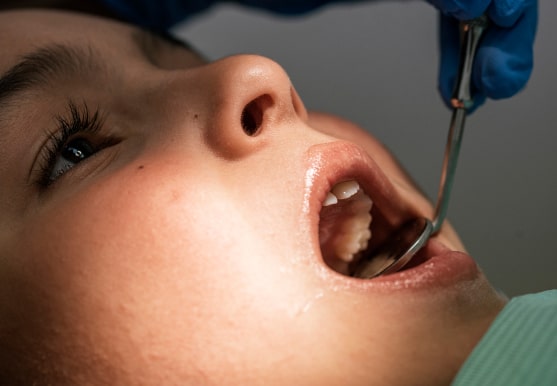SERVICES
Temporomandibular Joint (TMJ) Disorder Treatment, Symptoms & Causes
TMJ disorder treatment is designed to reduce pain in and around the jaw joints.
TMJ-TMD Treatment
Your temporomandibular joints, or TMJs, connect your lower jawbone to your skull.
These joints get a lot of use throughout the day as you speak, chew, swallow, and yawn. Pain in and around these joints can be unpleasant and may even restrict movement.

Symptoms of TMJ-TMD Disorder
If you notice that you are experiencing any of these symptoms, let your doctor know at your next appointment. Your doctor can help determine if you have TMD and create a customized treatment plan to help relieve the symptoms of TMJ-TMD.
Pain in the jaw muscles and their surrounding area.
Pain, ringing, or stuffiness in the ears
Frequent headaches or neck aches
Clicking or popping sound when the jaw moves
Muscle spasms in the jaw area
A change in the alignment of top and bottom teeth
Locked jaw or limited opening of the mouth
What is TMJ Disorder?
TMJ stands for temporomandibular joint. Temporomandibular joints are situated on both sides of your face. These joints are responsible for jaw movements like speaking, chewing, and giving facial expressions.
Temporomandibular joint disorder or TMJ disorder (TMD) refers to any dysfunction of these joints. The dysfunction in TMJ occurs when these joints become inflamed. TMJ disorder can cause pain and discomfort during jaw movements.


Causes of TMJ Disorder
TMJ disorder is mainly caused by injury to the jaw muscles or to the parts of the joint. Other causes for TMJ disorder include:
1) Excessive grinding and clenching of your teeth put stress on the joint.
2) Neck or head injury
3) Inflammation or swelling in the joint
4) Uneven or improper bite
5) Other diseases like Fibromyalgia or Rheumatoid arthritis
Treatments of TMJ Disorder
TMJ treatment can be divided into two types: surgical and non-surgical. If you’re not experiencing severe pain and discomfort from TMJ disorder, then you can treat it with non-sugical practices like:
1) Use an ice pack on the side of your face for about 10 minutes.
2) Consume soft foods
3) Wear a Dental splint or night guard
4) Avoid jaw moments as possible
Sometimes, the above non-surgical temporomandibular joint dysfunction treatment doesn’t fully relieve your pain and discomfort. If you suffer extreme jaw pain or difficulty opening your mouth, surgical orthodontics may be necessary. Schedule a visit to your dentist right away.


Benefits of TMD-TMJ Treatment:
1. Relief from Jaw Pain
Jaw pain is the most common symptom of TMD-TMJ. After the treatment, you’ll get relief from TMD jaw pain and any discomfort in your teeth or neck region.
2. Enjoy Food Again
TMJ pain can stop you from enjoying your favorite food. With TMJ-TMD treatment, you are able to chew your favorite food again. You’ll find a huge difference while chewing and speaking before and after TMJ treatment.
3. End of Teeth Grinding
When you suffer from TMJ disorder, you’ll develop the habit of heavily grinding your teeth(Bruxism). It is worse for your overall health as it puts massive pressure on your jaw.
4. Sleep Better
After the relief from chronic pain, you are sure to get better sleep. Also, your overall health will improve with temporomandibular joint dysfunction treatment.

Not all jaw pain is associated with TMD.
If you feel that you might have TMD, it is always important to see your dentist for an examination. However, not all jaw pain is associated with TMD jaw pain, and if you do not have TMD there are many different preventive steps you can take to maintain a healthy, strong smile.
Many people get TMD without ever having braces. Symptoms of TMD usually come and go regardless of whether braces are worn. If you are experiencing any of the symptoms listed above and are concerned that you’re a candidate for TMJ-TMD treatment, please contact our office for a consultation.
FAQs
Is Tmj Disorder Permanent?
Usually, the pain related to TMJ disorder is temporary. The pain and discomfort can be relieved with self-care without non-surgical treatment. Surgery is always the last option for TMJ disorder.
Which Doctor Treats Tmj Disorder?
TMJ disorder is often treated by a dentist. Dentists are specialized in oral health which includes the examination of the jaw and diagnosis of dysfunctions in the bite.
How Long Does Tmj Disorder Last?
TMJ disorder typically lasts for a few days to a couple of weeks. Sometimes, it can last months or years depending on the condition of the TMJ disorder.
TRANSFORM YOUR SMILE
Schedule a Visit
To set up a visit with our orthodontists at Mellion Orthodontics, complete and submit this form. Our scheduling coordinator will then contact you to confirm your consultation.
Please note this form is for requesting an appointment. If you need to cancel or reschedule an existing appointment, or if you require immediate attention, please contact our practice directly by calling us.